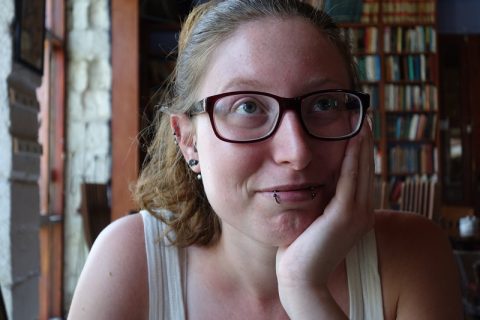First, Ilana, thank you so much for guest reading the SmokeLong Hebrew submissions these last few months. This is your final week. What kind of story have you been looking for?
I don’t think I’ve been looking for any story in particular. That’s the thing I love about flash, and about reading submissions for fiction in general—I’m surprised so often. The stories I’ve been reading have been so different from one another, and honestly, I’ve never read a more excellent batch of submissions. Maybe something about the length, or about it being a translation call, or where the call for submissions was circulated, but truly, the writers who’ve sent in their work have delighted me one after another. I feel incredibly privileged to have read all these stories.
I read somewhere that Hebrew can be very difficult to translate since some modern concepts are absent from the language. Have you found this to be true? What do you think are the challenges of translating Hebrew into English?
That’s interesting, and not entirely true. Hebrew is an old language, yes, very old, older than English by a lot, but the truth is that modern Hebrew is very, very similar to biblical Hebrew—modern Hebrew is just an updated version. It’s sort of like Shakespearean English versus what most of us talk every day—one is poetic and feels archaic, the other is just how we move through our everyday lives. What’s difficult in my opinion about translating from Hebrew to English is that the sounds of the languages are so incredibly different that getting across the same atmosphere, the same mood, is difficult. Where a Hebrew word may sound harsh and cutting in a bit of dialogue, for instance, the English translation might have rounded edges. So for me the difficulty is in making sure the translation is both literal and true but also attempts to capture the right tone.
Israel is a country populated by people from all over the world. What effect do you think this has had on the language?
Mostly, we have a lovely diversity of swear words. For years, I thought a swear word had originated in Arabic, but apparently it was Russian. Recently, I asked someone who actually is Russian about it and she says it’s been mangled almost beyond recognition. Otherwise, Hebrew remains largely quite pure to itself—of course it evolves and develops new slang words etc., but it’s always very clear due to how the words are constructed which have come from English (for instance, “telephone” is telefon).
If I had time to read only two writers in Hebrew, who should I be reading? Why these two?
This is a super difficult question because I’m going to be wrong no matter what I say and people are going to be upset by my choices. So let’s go with one classic, and one purely personal choice. The classic is the incredible S. Y. Agnon. I don’t quite know how to describe the incredible way he uses language, other than it reminds me sometimes of how I feel when I read Gabriel García Márquez. Not because the subject matter is similar, really, though Agnon has elements of magical realism in some of his work, but more because of the atmosphere they create, the way you sink deeply into their work precisely because it’s strange and sometimes discomfiting.
The other writer I’ll recommend is Esther Streit-Wurzel, who is sort of the Judy Blume of my Hebrew reading life—she was writing YA before it was a real designation. She wrote these gorgeous, long books largely about youth in various forms of distress, and some of them are also a bit historical and look back at sort of more idyllic times in Israel. Her characters glow for me.
I know you’re incredibly busy. What are you working on right now?
I am incredibly busy, it’s true! I am still running my podcast, The Other Stories, though I admit I am very behind on submissions and owe many people responses (if you’re reading this, I am SO sorry, and I have NOT forgotten you). I’m also working with the Prairie Schooner here in Lincoln, Nebraska where I’m going to school. I’m still writing book reviews, of course, and am plugging away on several fiction projects and still seeking representation. So – all good things, all busy things!

